-
|
05 September 2022
|Posteado en : Inf first person
Two delegations of foreign ministry and migration officials from Colombia and Ecuador arrive in Spain, on a study visit organised by the EUROFRONT programme, to learn about the border control model implemented in the Schengen area
Gema Palencia, a EUROFRONT technician, recounts the visit, which takes place between Madrid, Algeciras and Tarifa, in the form of a diary. A journey under the certainty that the only way to tackle transnational crime is through cooperation.
DAY I. 5 September 2022
There will be five days of visits to police institutions for migration management and cooperation, as well as border posts at airports and ports.
An interesting opportunity offered by the European Union programme co-led by the FIIAPP, EUROFRONT, to exchange processes and procedures, learn efficient interventions on both sides and find opportunities for collaboration that can be applied to Colombia and Ecuador and the other countries with which the programme collaborates: Argentina, Brazil, Bolivia, Peru and Paraguay.
With enthusiasm and the hope that from the meeting we will find greater opportunities for collaboration… Let’s get started!
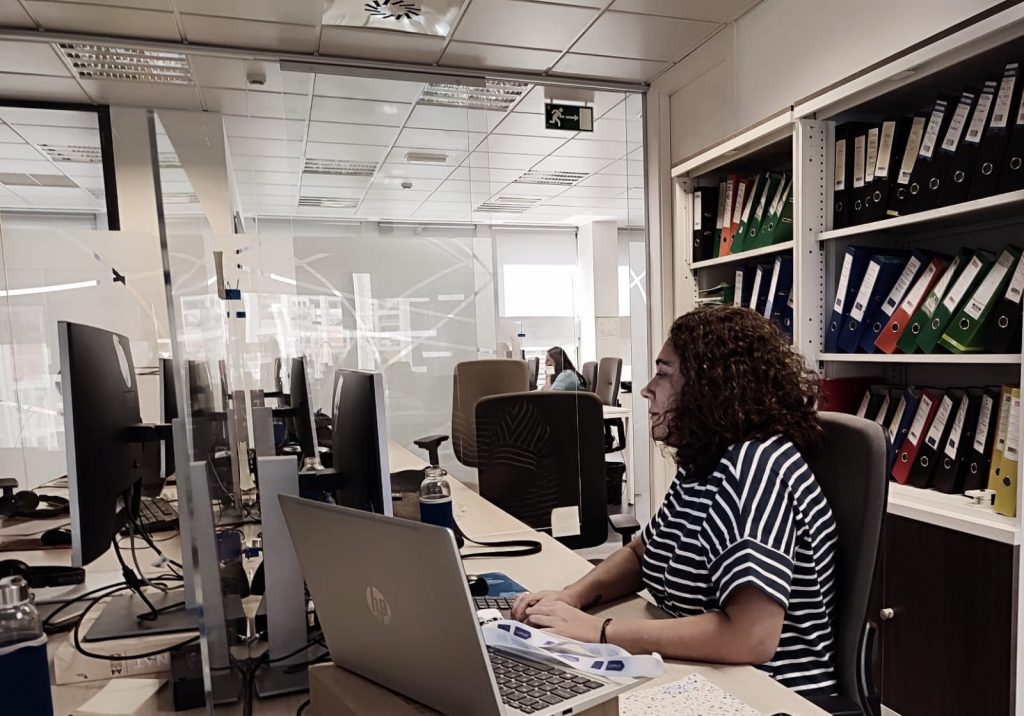
Gema Palencia, EUROFRONT technician, works in the FIIAPP office in Madrid organising the visit to Spain of delegations of foreign ministry and migration officials from Colombia and Ecuador. At the General Commissariat for Foreigners and Borders I meet the members of the delegations in person, and after numerous e-mail correspondence it is pleasant to put a face and a voice to the participants.
Despite the jet lag, they were particularly participative during the presentation by Commissioner General Julián Ávila Polo and in the subsequent presentations on the different units that make up the General Commissariat.
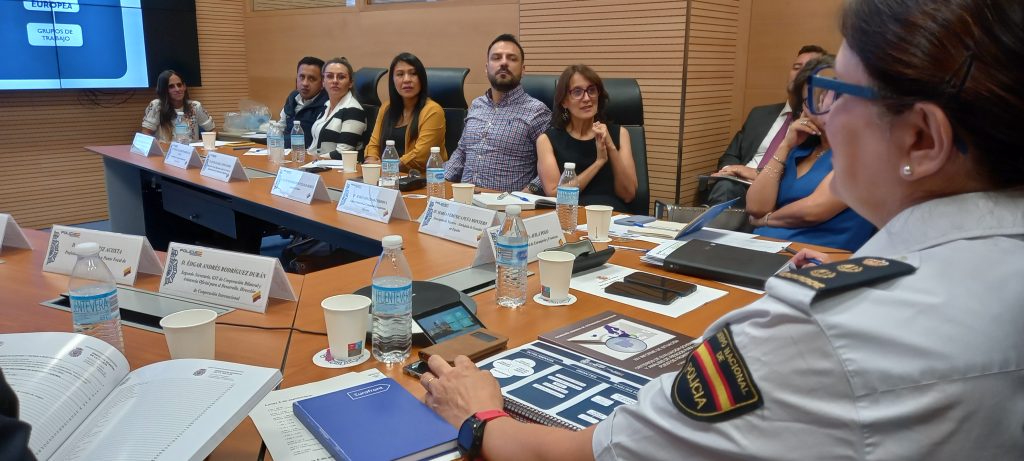
Delegations of chancellery and migration officials from Colombia and Ecuador during their visit to the Comisaría General de Extranjería y Fronteras in Madrid. Among the comments, the issue of the Venezuelan problem, common to all countries, and the exchange of information, came up for discussion. Another topic of interest is the successful experience of Punto Atenas, an operational document verification service run by experts in document forgery, which in ten months has dealt with 3,400 queries from various authorities. The idea of replicating a similar system in the Latin American region is met with great interest.
The afternoon is devoted to Barajas Airport and to getting to know in situ the operational border management in the Schengen area.
Full day 1, intense and with many open questions. We continue…
DAY II. 6 September 2022
On the way to the International Cooperation Division of the police, comments revolved around the previous day’s visit to Barajas Airport. The means of detecting forged documents or automated passages captured the most interest of the tour.
Information exchange and cooperation were the key words of Tuesday’s session. Based on the conviction that this is the only way to tackle transnational crime, the functions and effective results of the SIRENE Office, an exchange point with European police forces, as well as those of the INTERPOL and EUROPOL offices, were presented.
I continue to be surprised by the high level of interest of the delegations, and not only me, but also the rapporteurs, who are grateful to have such active participants. During his presentation, the Head of the Operational Section of the SIRENE bureau, Agustín Hernández, points out:
“A large part of today’s organised crime is transnational, therefore international police cooperation is essential to tackle it”
And among the debate arises the need to share data to combat new forms of irregular migration, and as an example, the citizens of Central Asian countries who use South American airports as a gateway to reach the United States.
The Division is also the key point of collaboration with Spanish Cooperation institutions, as it participates in the management of around 30 international projects, several of them implemented by the FIIAPP.
In the afternoon, train to Algeciras to learn about Operation Minerva and border management in the port area.
On the road…
DAY III. 7 September 2022
In the Bay of Algeciras, a sea and an ocean meet, two continents come together and cultures cross. A key point of entry to Europe from Morocco, between June and September it can see up to 2.5 million people pass through.
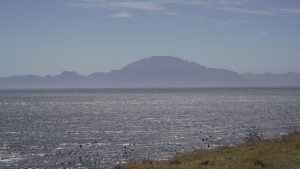
Moroccan coast as seen from Algeciras The delegations from Ecuador and Colombia have learned in situ how police teams with members of up to 17 nationalities are integrated to support the control of trafficking in persons and goods within the framework of Operation Minerva of the European Border and Coast Guard Agency (Frontex) and led by the Spanish National Police during the summer months.
This coordinated action streamlines management thanks to the specific knowledge of each country’s agents and the ease of access to their countries’ databases, which allows for rapid verification of travel documents.
An example of cooperation that has shown them the possibility of extending the current bilateral agreements that each country has with its neighbours to a regional level. The Undersecretary of the Ecuadorian Migrant Community, María Soledad Córdova, stressed that:
“The European Union is a strategic ally in border management and in addressing the challenges of migration”
They are struck by the magnitude of the movement of passengers, vehicles and goods and the effective organisational machinery in Tarifa and Algeciras, as well as the detection of irregularities and the effective cooperation that serves to alert or prevent crimes in other European countries.
It is also surprising how close Africa can be seen from the bay, much closer than it appears on the maps.
From the comments among the group and with the agents at the border, I perceive that the reflections after what we have heard and witnessed these days are taking more and more shape.
Day IV. 8 September 2022
After visiting the headquarters of the Central Unit for Illegal Immigration Networks and Documentary Forgery (UCRIF) in Madrid, we see the work on the ground in the Algeciras office.
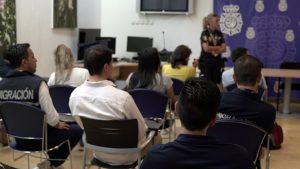
Border experts from Colombia and Ecuador during the explanations given by National Police officers at the Algeciras police station Issues detected at border controls are in many cases the thread that is pulled to unmask human or capital trafficking networks, or the clues that are shared with other international police forces, the missing piece of the puzzle to stop gangs that operate globally.
The second secretary of the Colombian Foreign Ministry’s International Cooperation Directorate, Andrés Rodríguez, points out during the visit:
“Migration challenges at the border must be addressed jointly and EUROFRONT is a programme that can provide important lessons for Colombia”
Questions about deadlines and procedures for irregular cases or the comparison of different legislations are the main part of the debate during the last day of the visit to Algeciras, in which delegations finalise all aspects related to cross-border crimes, from detection and control to investigation.
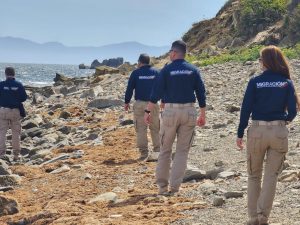
Members of the Colombian delegation observe the Moroccan coast from Algeciras And back on the train to Madrid… time for reflection. Friday’s day of conclusions looks set to be interesting.
Tomorrow we continue…
Day V. 9 September 2022
Last day….
We closed by learning about the ADEXTTRA database containing information and registration of foreigners. A swarm of interconnected databases, from various sources, which allows the cross-referencing and extraction of information of great use both for the police and for various public institutions that manage the issuance of documents and various procedures with foreigners.
The final assessment puts on the table new paths to follow in terms of training, bilateral and regional cooperation following the European model of the Athens Point, legislative harmonisation and formal follow-up, when the delegations return to their countries and the proposals to be followed are institutionally validated.
If there is one thing they all agree on, it is the positive thing of having seen that it is possible, and the high effectiveness of police and institutional cooperation, which is essential to combat cross-border crime.
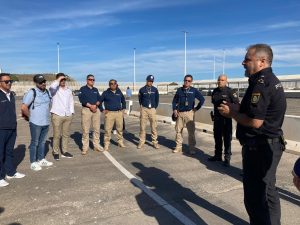
Delegaciones de Colombia y Ecuador escuchan las explicaciones durante su visita al Puerto de Tarifa The FIIAPP and EUROFRONT have also received some interesting learning. Víctor Suárez and Agustín Hernández, experts in foreigners from EUROFRONT who organised the technical visit and accompanied the delegations, emphasise how productive the exchange was and how productive it was to learn about other forms of management. They have now also noted down some highly recommendable ideas to incorporate into the processes in Spain.
The visit is over, but we are continuing with a closer and more effective collaboration, adapted to the needs of each country.
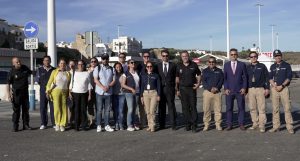
The delegations of Ecuador and Colombia pose with several agents of the National Police in the Port of Tarifa during their visit We go on…. And we are doing much better.
-
|
20 July 2021
|Posteado en : Interview
Civil Guard Colonel Javier Hernández coordinates the European CT-Public Spaces project to reinforce security in Ghana, Kenya and Senegal.
What has been the greatest achievement of your experience as an expatriate expert?
Managing the (CT-Public Spaces) project with repercussions in several African countries (Ghana, Kenya and Senegal), representing an almost 200-year-old institution like the Guardia Civil and succeeding in improving everyone’s security.
What are you most proud of?
Of having been able to convey our way of doing things, seriously and rigorously, to security forces in partner countries, and to have forged links with them that will last beyond the duration of the project.
How has your assignment helped to improve the lives of people and the planet?
We contribute to the security of citizens and to the development of their societies. If we succeed, we improve their day-to-day lives and based on this we improve their societies, making them freer and more prosperous.
What is the main value of the public aspect for you?
Providing citizens with security is, without a doubt, the legal responsibility of public administrations, but we all have a role in this regard. In our project we set out to involve the private sector. We must all cooperate within our respective skills areas.
What have you learned from this experience?
You are always learning and it is always possible to do things differently. Each country has its own ways of doing things, times, customs and influences. We must be open to these and we must adapt our procedures to the circumstances, try to collaborate without dictating, inspire trust and establish ties that ensure the continuity of this collaboration, as well as the appropriation of what has been learned by the different security forces of the partner countries.
-
|
11 February 2021
|Posteado en : Opinion
The SENSEC-EU cooperation project has spent 3 years working to improve the efficiency, effectiveness and accountability of Senegal's internal security services. To this end, many people have contributed their professional skills, one of them is Nuria Roncero, key expert in the border control and surveillance component, who tells us about her personal experience in this project.
All journeys into the unknown begin with mixed feelings. The uncertainty that commonly forms part of our life becomes clearer and more evident. They are the same sensations one has when starting a holiday going to a distant and unknown country. In this case, you have to add the professional responsibility you are engaged in when going to start a new project. Very exciting, because I love my work; I’m very fortunate.
This is how my trip to Africa began, with a suitcase full of many years of professional experience and personal anecdotes and ready to take charge of tasks that I had no knowledge about in terms of how border security and management is carried out.
It wasn’t about leaving my comfort zone, it was all self-driven.
After a trip in which my inquisitive look at what is different to me was mixed with looks back expressing the same thing, I arrived at my destination, Dakar, with my eyes closed because at two in the morning the darkness everything. The first weeks, in which I was bombarded with information, were followed by others which were more chaotic with border closures due to COVID, which at that time was beginning in our country and the rest of the world. All continents were affected and Africa was not going to be less so.
It was not easy. It wasn’t for anyone and it wasn’t for me either.
Africa has a different pace of life, different smells, different colours and different flavours from the ones I knew.
You have to dive into it all to understand the daily workings of a country that smile at you every day despite all the calamities and poverty. Interpersonal relationships also have their own codes, such as the fact that some handsome, well-built Senegalese man asks you about your family as soon as they meet you. A coffee with another female member of the work team clarified the matter for me. It is typical before being asked out on a date, to be asked if you are involved with anyone, whether you have children or not or any other type of personal relationship. This question is answered by naming family members or saying what one feels appropriate at the time, opening or closing the door to more intense interactions.21
Little by little I got to know all the people who were part of this project, Police, Gendarmerie, Customs, administrators from all the Ministries, personnel from all parts of the world who are working in and for this country, Spanish colleagues stationed here for one reason or another and who give you all their support.
And so, building professional and personal connections, supported by the technical team from Madrid, we were creating border posts in strategic places, police stations to fight against irregular immigration and human trafficking, as necessary for them as for us, hangars for police aircraft, river detachments to fight against all kinds of illicit trafficking, creating manuals from scratch to ensure that all the training that we have given to more than 400 policemen, gendarmes and customs officers becomes permanent.
We have trained ultralight aircraft and drone pilots and we have taught them to navigate and monitor, with new boats, the area of the “mangroves of Sine Saloum”, a very beautiful area, where every type of piracy imaginable goes on. We have made great efforts to ensure that there is a little more security in a country where “téranga”, the spirit of hospitality, is its watchword.
And after a year of hard work, having left behind my initial feelings of fear and uncertainty, I will soon be getting on a plane with no return ticket for the moment, leaving much of my professional experience and many emotions behind in this country. I can assure you that the suitcase I am taking back is loaded with unrepeatable experiences. It took me all this time to get to know the true essence of Africa and I am convinced that there is still much to discover and many codes to decipher.
But that will be for the next trip to Senegal.
Nuria Roncero, key expert in the border control and surveillance component of the SENSEC-UE project
-
|
25 October 2018
|Posteado en : Interview
Javier Navarro, National Police inspector and technical expert on the FIIAPP programme to support the Bolivian special force fighting drug trafficking, shows us in this interview how complicated it is to pursue the production and illegal trafficking of coca leaf in Bolivia, where it is grown and consumed legally
How do people see the coca leaf in Bolivia?
The production and consumption of coca leaves are deeply rooted in society and its customs. The Plurinational State of Bolivia has acknowledged that there are 20,000 ha of coca plants being grown in two main areas: Las Yungas, in the department of La Paz, and Chapare, in the tropical region of Cochabamba. Producers are registered and are entitled to grow one “cato” of coca (1,600m2). The coca leaf they grow then goes to a cooperative and from there onto the legal market, either for personal consumption, called “picheo”, i.e., balls of coca leaves are put into the mouth and the juice sucked out of them, or for coca mate, sweets and other products. All that comes from these areas is considered legal cultivation. The Government also has to manage the eradication of coca leaves in places where their cultivation is not authorised.
How does it become illegal?
Logically, not all the production goes onto the legal market; some of it follows parallel routes and is used to make coca paste. The paste is the result of adding other elements to the coca to produce cocaine hydrochloride.
Also, it should be remembered that Bolivia is not only a producer, it is also a transit country, as paste arrives from Peru, another producing country that has some 45,000 ha of coca cultivation.
So, what is the profile of a coca leaf producer in Bolivia?
It is, purely and simply, that of a farmer, who, with one “cato” of coca, earns just enough to make a modest living. That is the reality and what I see. Can this coca leaf subsequently be processed or go to an illegal market? It may do, but the producer par excellence does not have the profile of a trafficker.
The producers produce it as part of their basic subsistence economy, to live decently with their families, and producers are different from traffickers. Maybe this would be the smallest link, the lowest on the chain, where a producer is making it illegally.
What resources does Bolivia have to prevent illegal trafficking?
The government has the Bolivian police force, especially the Special Forces to Combat Drug Trafficking, a vital ally in the fight against drug trafficking. These are special squads that are found all over Bolivia and they try to prevent drug trafficking from intensifying.
What is the role of the project in this network?
The project tries to provide support and strengthen departments and institutions linked with drug trafficking by bolstering their skill sets through technical assistance (legal, protocol, manuals), for which we co-opt experts in the short term from the National Police and Civil Guard in addition to French experts. The latter give assistance in very specialised areas, to strengthen the aspects that they consider necessary. Specifically, five themes are dealt with: criminal investigation, intelligence, borders and airports, and related crimes (money laundering and people trafficking and smuggling).
What are the prospects for the future?
The project is solid and well established; in fact, it is the institutions that turn to it so that they can become stronger in the areas they consider the weakest. This year, we have been working on all the areas to consolidate them and strongly reinforce them and next year will see the final implementation.
We also hope that, logically, when this first part of the project ends there can be a second part, as this would be very important, so that we could continue to strengthen these areas and move forward and improve all the Bolivian institutions.
-
|
28 June 2018
|Posteado en : Reportage
The revolutions in North Africa and in the Middle East initiated democratic reforms, but also left space for threats such as terrorism. In both cases, cooperation has played and continues to play a determining role
In 2011, people took to the streets of the Middle East and North Africa. The Arab world called for democracy and rights in their countries through popular protests that were included in the concept of Arab Spring. Seven years later, the changes are not entirely noteworthy. Armed conflicts and terrorism have curtailed many of those expectations. However, political, economic and social reforms were initiated, which in some cases continue to develop at a slower pace.
These are processes in which cooperation has played and can play a determining role, contributing experiences from other countries that have gone through similar situations or confronting threats that slow down development. In this context of transition, several projects in the region are managed by FIIAPP with European Union funding. Those that have to do with justice and security particularly stand out.
Tunisia was the first country where revolution was mentioned. Since then, “there has been a first democratic election, a constituent government and an approval of the Constitution in 2014”. This was explained by Ángel Llorente, coordinator of the project to accompany judicial reform in the country that ends this year. The objective has been to carry out “an organisational reform as a consequence of the process of democratic transition” in the Ministry of Justice. And to create from there an independent judiciary that had never existed in Tunisia.
Despite some resistance that could have meant a step backwards, Llorente believes that civil society will not let that happen: “They are very aware of their rights, I think it is very difficult that they could now give up something that has cost them a lot to achieve”. An enthusiasm that reminds him of Spain a few years ago.
EuroMed Justice IV is also committed to improving judicial systems. In this case, in the southern region of the Mediterranean. Algeria, Egypt, Israel, Jordan, Lebanon, Libya, Morocco, and Syria are working together with the Spanish and French Ministries of Justice to create an efficient, democratic system that respects human rights and is consistent with international regulations .
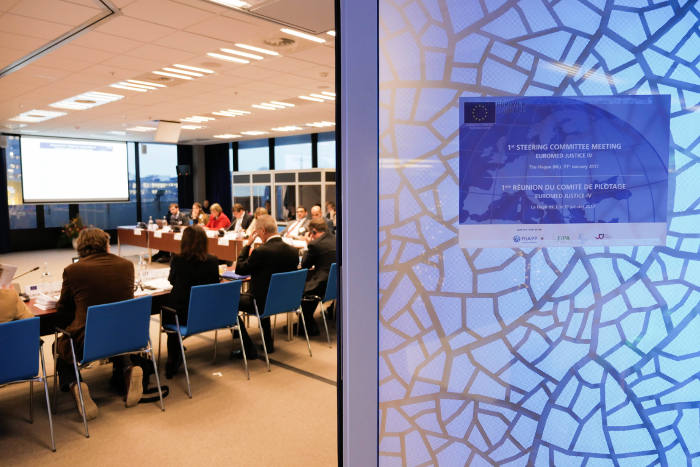
Meeting of EuroMed Justice IV in The Hague In its fourth phase, the project is also part of the EU’s neighbourhood strategy. Most of these countries are included in the European Neighbourhood Policy, which was revised precisely in the context of the Arab world revolutions to provide better support in their democratic transitions. After all, its main objective is to strengthen relations with neighbouring countries in the community space, based on common values – democracy, human rights and the rule of law – and to promote greater economic integration, mobility and stability.
Relationships that, in the case of EuroMed Justice IV seek a necessary international judicial cooperation, according to Victoria Palau, coordinator of the project. “There are problems, such as terrorism, cybercrime and human trafficking, that, if not resolved at the regional level, are impossible to address,” she says. In this context, the project witnessed the first declaration of collaboration between European public prosecutors and the Mediterranean countries, to work together to address these problems.
Judicial cooperation is also one of the components of the project for the application of the Rule of Law in the Horn of Africa and Yemen, the objective of which is to fight against security threats. In particular, it works to improve the capabilities of the intelligence services, the security forces, and the prosecutors and courts.
Eritrea, Ethiopia, Kenya, Somalia, Sudan, South Sudan, Uganda, Yemen and Djibouti are the countries that benefit from this project funded through the Instrument for Stability and Peace (IcSP). What happens in these countries, even if they are not included in the neighbouring region of the EU, does affect the continent.
In addition, it is an example of how terrorist groups take advantage of moments of political instability to act. “When there is a power vacuum, these groups always try to sneak in with more or less success,” says Javier Vega, project coordinator. In the end, terrorism is an increasingly global threat with an important focus in this geographical área.
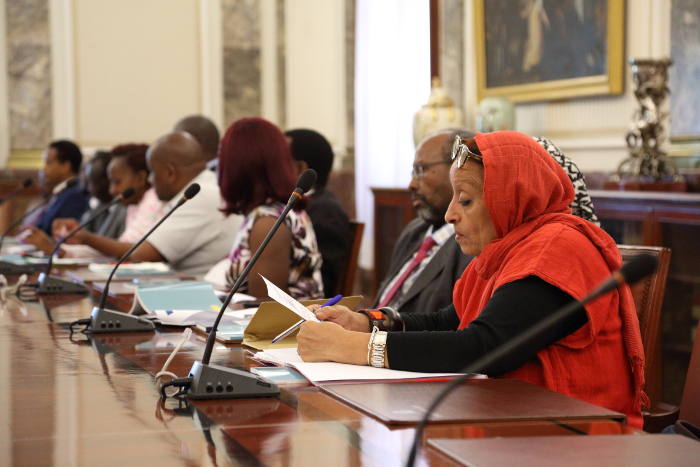
Visit of judicial authorities from the Horn of Africa to the State Attorney General’s Office The key is to act regionally so that it does not spread to the rest of the world. For example, by controlling the territory as is also done in the Sahel region – through the Rapid Action Groups – and in Niger, more focused on illegal immigration.
The European Security Agenda underlines the need to take measures to deal with this threat in a more effective and comprehensive way, including the international community and cooperation projects. One of the latter, also managed by FIIAPP, focuses specifically on the fight against terrorism in the MENA region (Middle East and North Africa).
Work that, according to Mariano Guillén, director of the Justice and Security Area with FIIAPP, also seeks to “strengthen the political dialogue within the Arab League”, to favour cooperation among the countries of the region. Morocco, Algeria, Tunisia, Libya, Egypt, Jordan, Lebanon, Iraq, Syria and Palestine are the countries that, despite their political, economic and social differences, work to find common responses to terrorism. “The terrorist threat does not distinguish the levels of development in the countries and it can only be attacked through cooperation,” says Mariano Guillén.
The instability of the changes leaves room for security threats that do not recognise borders. But the same changes are necessary if we see them as an opportunity to improve, as a good time to draw on similar experiences while working together on those problems that affect us all.
-
|
16 November 2017
|Posteado en : Reportage
The European Commission Programme aims to give technical assistance to countries to guarantee the safety of their citizens
In Latin America there are 23 homicides for every 100 thousand inhabitants. This figure is double the amount for Africa and five times the amount recorded in Asia. What’s more, with only 9 per cent of the world’s population, Latin America accounts for more than 30 per cent of the violent killings committed worldwide each year.[i]
Many of these are related to organised crime. This is one of the reasons why the sense of insecurity experienced by citizens has increased in recent years, making it a priority for these countries.
For many years, different policies to combat organised crime were tried out in Latin America. Some were repressive and others more moderate (such as “mano dura” or “iron fist” and the converse “mano blanda” approach applied in Guatemala from 2007 to 2015), with the feeling that the problem was not effectively dealt with. The reasons are many and varied, but the periodical and “short-term” nature of these policies may explain their ineffectiveness. One of the main lessons learned was the correct use of more global and long-lasting policies to identify and end insecurity in the region.
This is where EL PAcCTO (Europe Latin America Assistance Programme Against Transnational Organised Crime) comes onto the scene. A European Commission programme with pioneering content as it is the first time the whole criminal justice chain is dealt with as a whole. More specifically, it focuses on three areas (police, judicial and fiscal and the prison system) with five transversal work focuses (cyber crime, corruption, human rights, gender and money laundering) and the inclusion of two intrinsically linked projects (AMERIPOL and another project managed by Interpol). It is, therefore, an ambitious and complex project which will try to tackled the problem of organised crime in the most global and effective way possible by providing technical assistance to 18 Latin American countries (Argentina, Bolivia, Brazil, Chile, Colombia, Costa Rica, Cuba, Ecuador, El Salvador, Guatemala, Honduras, Mexico, Nicaragua, Panama, Paraguay, Peru, Uruguay and Venezuela).
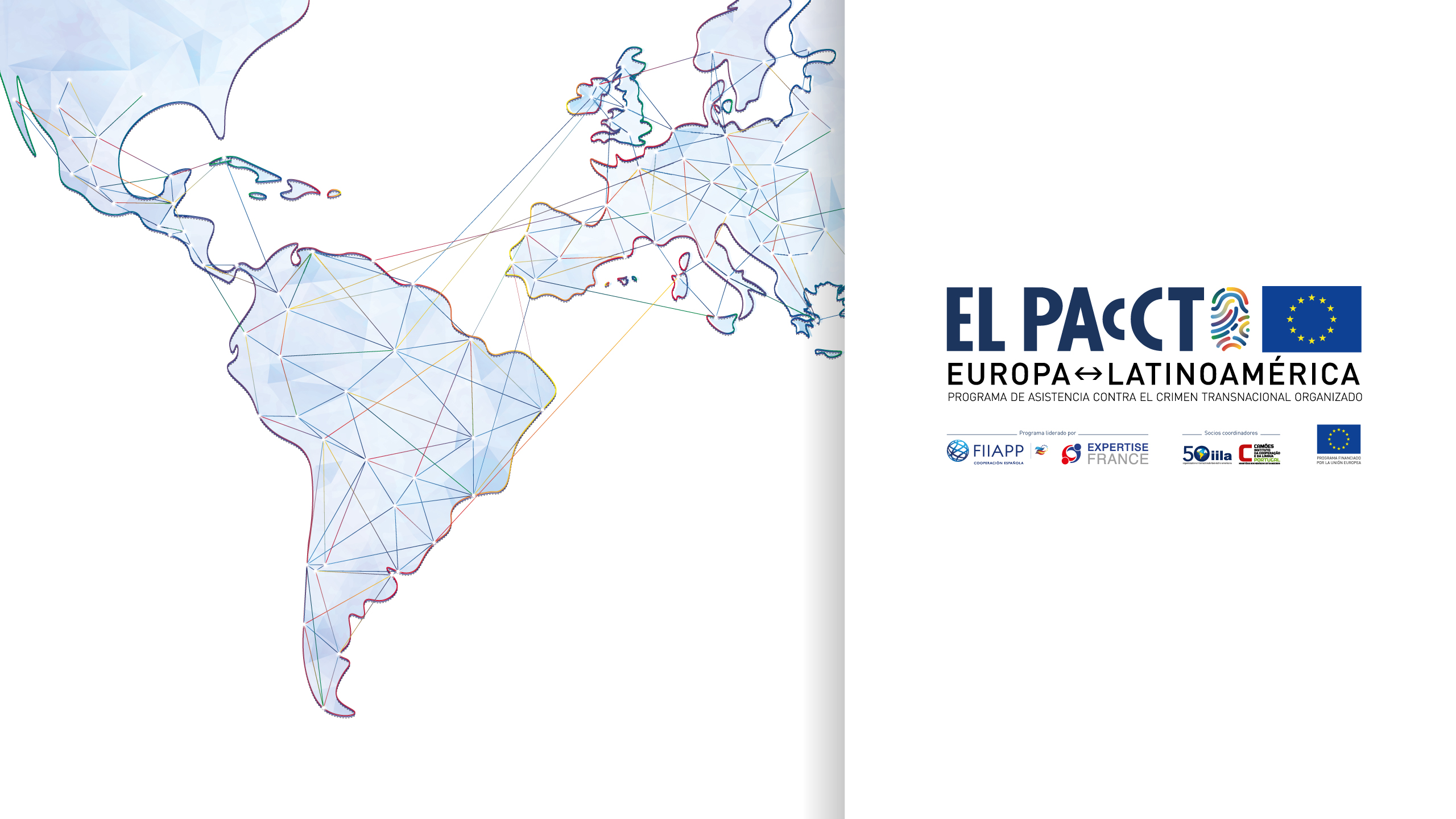
The International and Ibero-American Foundation for Administration and Public Policies (FIIAPP) and Expertise France (EF) coordinate the project along with two partners, the Italo-Latin American Institute (IILA) and the Camoes Institute.
The Programme will facilitate peer learning, South-South cooperation and the transfer of best European practices, and will be focused on public administrations. To do this, it will have the support of the Spanish General Council of the Judiciary, Ministry of the Interior via the Civil Guard, National Police and Prison Institutions, Ministry of Justice, the Public Prosecutor and their analogues in France, Italy and Portugal.
EL PAcCTO seeks to create concrete guides and tools for international action, approval and cooperation, both regionally and between Latin American countries and EU Member States. This way, it aims to eliminate border using legal and technical solutions that make Latin America a free and safe space united against organised crime.
The Programme is trying to respond now to all of the urgent demands from the countries because the aim of the programme is to build a safer society which benefits everyone. This is why it is important to increase social awareness about the dangers of organised crime. It is a matter of great importance to guarantee people’s rights, freedom and lives.
[i] Highest murder rates in the world by city (2016), World Atlas. Available at http://www.worldatlas.com/articles/most-dangerous-cities-in-the-world.html
María Jesús Martín is a Communication Technician at EL PAcCTO (Europe Latin America Assistance Programme Against Transnational Organised Crime) comes onto the scene.






